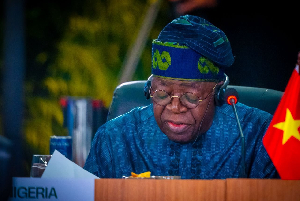The Association of Telecommunications Companies of Nigeria has assured Nigerians that the deployment of the Biometric Voter Accreditation System and electronic transmission of results of the 2023 election are possible with the quality of telecoms architecture available in the country.
ATCON, the umbrella body for all the telecoms companies in Nigeria, including MTN, Airtel, 9Mobile, Glo and other operators, said the nation’s telecommunication infrastructure had matured to the level it could transmit election results in 2023.
The Chief Operating Officer, Association of Telecommunications Companies of Nigeria, Ajibola Olude gave the assurances in an interview with The PUNCH on Sunday, against the backdrop of the scepticism expressed by the All Progressives Congress leadership on the BVAS and e-transmission of results.
APC National Chairman, Abdullahi Adamu, had expressed doubts over INEC’s capacity to deliver a credible election using the BVAS and the Results Viewing Portal, otherwise known as the electronic transmission of election results.
He expressed his reservation when a Commonwealth delegation on the 2023 general elections paid a courtesy visit to him at the party secretariat in Abuja last Wednesday.
Adamu’s fear was re-echoed by the party’s National Organising Secretary, Suleiman Argungu, who identified stable power supply as one of the obstacles facing the innovation.
Argungu also cited his home state of Kebbi as an example of an area where such technology could experience some hitches.
Their positions generated strong reactions from the opposition parties, including the Peoples Democratic Party, Labour Party, New Nigeria Peoples Party and others, which accused the ruling party of plotting to rig the election.
But the two party chieftains 24 hours later clarified the reservations they made on the technology, stating that they were not opposed to the deployment of the innovation during next year’s polls but merely tasked the INEC on its readiness to deploy the technology.
Claiming that he was misquoted, Adamu in a statement by the APC spokesman, Felix Morka said, “At a meeting with the Commonwealth pre-election delegation, yesterday, Wednesday, November 23, 2022, in response to a question regarding the country’s preparations for next year’s election, the national chairman noted that while preparations were in top gear, he tasked INEC to take effective steps to bridge any gaps that may be created by electricity and telecommunications network challenges in certain outlying voting districts in the country to ensure a smooth and successful deployment of BVAS and other technologies to ensure free and transparent elections.”
Morka further argued that the APC regime of the President, Major General Muhammadu Buhari (retd.), midwifed the successful reform of the Electoral Act and BVAS, among other technological innovations and has superintended the conduct of credible, free, fair and transparent elections in Edo, Anambra, Ekiti and Osun states.
However, speaking on the capacity of the telecoms to transmit election results without hiccups, the COO, the Association of Telecommunications Companies of Nigeria, Olude, said the Nigerian Communications Commission has been pursuing rural telephony vigorously to ensure national coverage before the election.
He observed that areas that did not have Internet access could use Short Message Service technology to send results in real-time, stressing that there would not be a problem using the telecommunication network to transmit election results.
Olude stated, “We are ready for electronic transmission of results. Our network has matured to the level that it can be used for result transmission. As regards the access gap, you can see that the NCC has been pursuing rural telephony vigorously.
And I want to believe one of the reasons the NCC is saying everywhere must be covered is because of the elections.
“We have the technology, and our network is mature enough to be used for poll results transmission. Areas that do not have the Internet can use SMS technology to send results in real-time to probably the capital of the state to update the result. I don’t think there will be a problem using a telecommunication network to transmit election results.”
General News of Monday, 28 November 2022
Source: punchng.com













